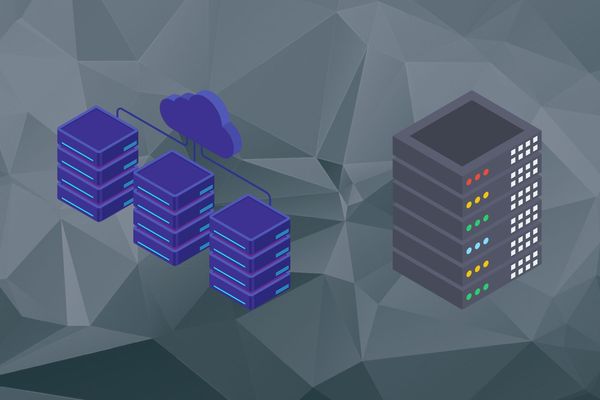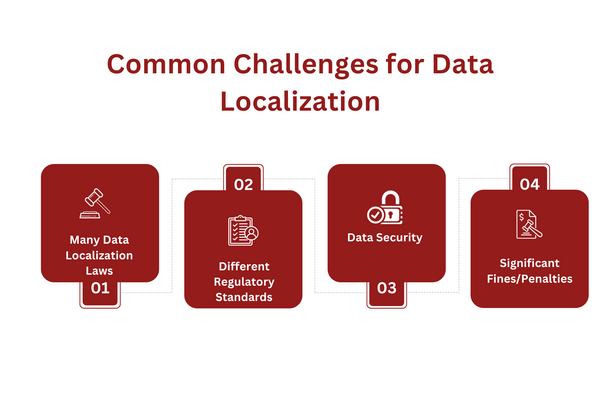
Your business can’t miss out on data localization practices when navigating the complex requirements in place. Several laws exist with data localization requirements, and your business is legally required to comply with these ever-changing rules. But what is data localization?
Understanding data localization laws and concepts is crucial to creating adequate data storage and data privacy practices for your business. Getting ahead and studying these laws sooner rather than later ensures your compliance with localization laws and up-to-date data protocols.
We are here to help you do just that. To further your understanding, this article will cover data localization in detail, when it is required, how it works, and common challenges businesses face when implementing.
Let’s get started.
Key Takeaways
Several countries, such as China, Russia, Brazil, and countries in the EU, have some sort of data localization law. If your business collects data from residents in these countries, it must also store and process the data within these countries.
Your business can localize data by storing it within a country physically on servers or networks. If you operate outside of that country, you can utilize local cloud service providers to store your data safely.
Some challenges of data localization are overlapping laws and jurisdiction, complex regulatory standards, strict data security requirements, and significant fines.
What is Data Localization?
What is Data Localization.jpg

Data localization refers to the process of collecting, storing, and processing data in the same country where it originally came from.
Given the ability to effortlessly send data overseas, many data localization laws create processes to follow before transferring data to another country.
For example, if your business collects data from residents in China, you must store and process that data in China before transferring it to any other country. Localization laws are not limited to any specific consumer demographic, type of data, or type of business.
Data localization keeps consumers’ personal data secure within the country it originated from. Transferring personal data to other countries exposes it to nearly many more risks and, with highly sensitive data, could threaten a country’s national security.
To follow data localization requirements effectively, your business must be familiar with the specific regulations in each country or region you operate.
The EU has different localization laws for the data you transfer depending on the country, with some being much easier to transfer to while others need to go through more regulations.
Your business must understand the specific laws in each country in which you collect data to ensure your business’s corporate compliance and maintain acceptable data privacy and data localization standards.
When is Data Localization Needed?
Data localization is required in countries like the UK, Brazil, and China, regulated by large compliance frameworks. If your business collects consumers’ personal data in these countries, you are subject to the localization laws in place.
Some significant data protection frameworks that require data localization are
General Data Protection Regulation (GDPR) – All countries in the EU
Personal Information Protection Law (PIPL) – People’s Republic of China
Federal Law No. 149-FZ Russia
General Data Protection Law (LGPD) – Brazil
These frameworks enforce the data localization laws in each country, and if your business does not follow the law, you face the penalties associated with non-compliance.
Specific requirements of data localization laws include adequacy decisions, security assessments, data privacy specialist certifications, contracts, and that your business provides particular details of the personal data involved in the transfer.
However, even in countries with no specific data localization laws, industries like healthcare, banking, and e-commerce, in particular, are subject to specific requirements for processing data out-of-country.
Data Localization vs Data Residency vs Data Sovereignty
In your research on data localization, you may have come across the terms data localization, data residency, and data sovereignty. All terms relate to how your business stores and processes data within a specific country or region but slightly differ in their definition.
Data Residency
Data residency refers to the physical location where your business stores consumers’ personal data. The actual location of any hard drives, servers, or physical files is known as the data residency.
Data residency is an essential term for your business to understand to comply with data localization laws and data protection frameworks.
Data Sovereignty
Data sovereignty is defined as the ability of a local/national government or other authoritative body to control and regulate how your business collects, stores, and processes personal data.
Enforcement agencies that protect and apply regulations to your business are granted their authority by the data sovereignty granted by the law.
Data Localization
This refers to laws requiring businesses to collect, process and store data within the borders of a certain country where its activities take place. With these regulations, companies cannot store information about their customers outside that specific geographic location.
How Does Data Localization Work?
How Does Data Localization Work.jpg

If your business is required by law to implement data localization, but you are unsure how it works or where to start, we can help. There are a few different methods to implement data localization into your business.
You should always first consider the type of data you collect and the relevant laws and frameworks of the country you operate in.
On-site Storage
The first method is to simply store the data your business collects on-site within the country in which you operate. Physical storage and facilities that your business owns are simple; you must simply keep and process the data there.
However, if your business uses third-party servers or storage providers, they must also operate locally.
Cloud Storage
If your business operates out of a different country than the country you collect data from, you will likely use a cloud system to store that data. To localize that data, you must find a cloud storage provider or similar service that has the option to operate entirely within the country you collect from.
Data Transfers
If your business has multiple data centers or storage facilities, you may need to transfer data between them regularly.
Data localization laws like the GDPR and PIPL have strict requirements concerning data transfers, so it is essential to ensure your transfers happen with proper approval.
Data Processing
After you collect and store data within a country, localization laws will require that you also process that data within the country it was collected from. If your business does not have adequate facilities or technologies to do so, you must invest to acquire them within the country.
Technologies can include cloud services, networking, and any additional storage centers you need to establish to hold data in that location.
Common Challenges for Data Localization
Common Challenges for Data Localization.png

Implementing data localization is not an easy task for some businesses. Some countries have heavy requirements in data localization laws and can limit your business’s communications and processes to the point of inefficiency.
Here are some common challenges businesses face with data localization and how we can help:
Many Data Localization Laws
The first challenge many businesses face is navigating and juggling the multiple and sometimes overlapping data localization laws of one location. For example, if your business operates in China and Russia, there are numerous data protection laws that all have authority over how your business processes data.
If these laws overlap and your business is subject to multiple laws that require data localization, there can be a long list of requirements to meet. The amount of information can be overwhelming, and you may not know where to start or what you need to comply with all the laws.
That is where we come in. You can outsource the help of our team of compliance professionals at Captain Compliance. Our experts can help you navigate overlapping data localization laws to determine exactly what technology and processes you need to remain compliant.
Different Regulatory Standards & Interpretations
The standards set in place by data protection regulations and localization laws are often up for interpretation. And these interpretations can differ.
But when your business is trying to decide what technology to invest in to meet these standards, the differing interpretations can make it challenging.
At Captain Compliance, we bring years of experience and compliance expertise to help your business decipher the specific language and standards laid out in regulations and assist you in crafting a compliance plan so you can make a suitable investment for the future.
Data Security
There is an essential role your business must play to protect that data internally. Many localization laws and regulations require varying levels of data security for any business that processes data in that country.
Our comprehensive list of data protection compliance services can help your business secure all data and meet the rigorous requirements of localization laws. We provide audits/risk assessments, staff training, policy/protocol creation and implementation, and incident response planning.
Significant Fines/Penalties
The last challenge businesses face is the significant, sometimes overwhelming fines and penalties that data localization laws impose on non-compliant businesses.
With potential fines of up to tens of millions of dollars (or more), you may be afraid to enter a new market or continue your business in another to avoid these fines.
But don’t worry, we can provide you with a full suite of compliance solutions, including specialized data solutions that ensure your business complies with all localization laws and avoids the risk of hefty fines.
Closing:
Data localization is the storage and processing of personal data within the country which your business collected it from. Many countries and regions have data localization laws that legally require your business to localize the data it collects as an extra security measure.
Your business can store data on-site or on a local cloud, but before you do so, you must understand the complex and sometimes overlapping localization laws in place.
Get in touch with us so we can help you decipher the complicated data localization laws and ensure your corporate compliance with all required regulations. Our compliance services cover every aspect of data protection you need so you can focus on the other essential operations of your business.
FAQs
What is the purpose of data localization?
Data localization is an additional step in many countries’ national data protection efforts. Keeping citizens’ data within borders reduces risks of exposure and misuse.
Learn about China’s PIPL and its data localization requirements here
What is the difference between data transfer and data localization?
A data transfer refers to the moving or sending/receiving of data between two points, typically across borders. Data localization is maintaining all data storage and processing within the country in which it was collected.
Click here to see our comprehensive guide on data transfers
What are the risks of data localization?
Data localization is meant to protect consumers’ data but can make it harder for business’s data security systems to operate. By slowing down information sharing or making it nearly impossible if your business operates across borders, it can be challenging to communicate potential risks or important updates internally.
To avoid inefficiencies and ensure compliance with localization laws, get in touch!
How can I implement data localization?
To implement data localization, your business can utilize local data storage providers or create storage facilities in the country you need. You can also use local cloud providers or data storage services to store your business’s data locally.